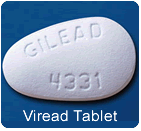Tenofovir
(Viread) Produces Long-term Response in Chronic Hepatitis
B Patients with Prior Treatment Failure
 |
 |
 |
 |
 |
 |
 |
| SUMMARY:
Tenofovir (Viread) monotherapy produced
long-lasting response in HBeAg positive
and negative chronic hepatitis B patients
who had experienced treatment failure using
other nucleoside/nucleotide analogs, according
to a study reported in the January
2010 issue of Hepatology. Pre-existing
resistance to lamivudine
(3TC, Epivir-HBV) did not impair response
to tenofovir, though adefovir
(Hepsera) resistance reduced it by half.
Tenofovir was well tolerated, with no serious
adverse events. |
|
 |
 |
 |
 |
 |
 |
 |
By
Liz Highleyman
 Several
nucleoside/nucleotide analog drugs (NAs) are active
against hepatitis B
virus (HBV), but the virus can mutate to develop
resistance to these agents. Many people treated with
lamivudine monotherapy -- the former standard of care
-- experience HBV breakthrough as this resistance
emerges.
Several
nucleoside/nucleotide analog drugs (NAs) are active
against hepatitis B
virus (HBV), but the virus can mutate to develop
resistance to these agents. Many people treated with
lamivudine monotherapy -- the former standard of care
-- experience HBV breakthrough as this resistance
emerges.
Tenofovir, a nucleotide analog which has been used
for a decade to treat HIV, was approved
for the treatment of chronic hepatitis B in August
2008. Studies suggest that HBV may not develop
resistance as readily to this tenofovir.
Florian van Bömmel and colleagues from Germany
and the Netherlands performed a retrospective analysis
to assess the long-term efficacy of tenofovir monotherapy
in patients with prior treatment failure or resistance
to other NAs.
The multicenter study included 131 participants. About
70% were men and the mean age was 42 years; 65% were
hepatitis B "e" antigen (HBeAg) positive,
the remainder HBeAg negative. At enrollment, patients
had HBV viral load > 4.0 log copies/mL and had
been taking tenofovir for at least 6 months. At the
time of tenofovir initiation, the mean HBV DNA level
was 7.6 log copies/mL.
Prior treatment consisted of lamivudine monotherapy
(n = 18), adefovir monotherapy (n = 8), lamivudine
followed by adefovir (n = 73), or lamivudine with
adefovir subsequently added (n = 29); 3 patients had
experienced treatment failure using the newer drug
entecavir (Baraclude).
Resistance analysis (done for 113 patients) revealed
that 62% had lamivudine resistance mutations and 19%
had adefovir resistance mutations.
All participants started tenofovir (300 mg/day), which
they took as their sole anti-HBV drug. The mean treatment
duration was 23 months (range 6-60 months).
Results
 |
Overall,
the cumulative proportion of patients achieving
HBV DNA < 400 copies/mL was 79%. |
 |
Lamivudine
resistance did not influence the antiviral efficacy
of tenofovir. |
 |
However,
patients with adefovir resistance were about half
as likely as non-resistant patients to respond
to tenofovir (52% vs 100%, respectively). |
 |
Nontheless,
HBV virological breakthrough (HBV DNA increase
after suppression < 400 copies/mL) did not
occur in any patients during the observation period.
|
 |
Factors
including age, sex, presence of liver cirrhosis,
and HBeAg status did not influence response to
tenofovir. |
 |
24%
of patients experienced HBeAg loss, after a median
duration of 11 months. |
 |
3%
experienced hepatitis B surface antigen (HBsAg)
loss, after 9, 17, 23, and 25 months of tenofovir
treatment. |
 |
65%
of patients with elevated ALT at baseline experienced
ALT normalization. |
 |
No
significant adverse events were reported during
tenofovir monotherapy. |
 |
No
ALT flares (> 5 x upper limit of normal) were
observed while taking tenofovir. |
 |
No
significant increase in creatinine was observed
(a marker of kidney function, assessed because
tenofovir has been linked to kidney impairment
in a small proportion of susceptible HIV patients).
Based on these findings, the investigators concluded,
"[Tenofovir] monotherapy induced a potent
and long |
Based on these findings, the investigators concluded,
"[Tenofovir] monotherapy induced a potent and
long-lasting antiviral response in NA-experienced
patients with previous treatment failure."
"Our data may have implications for current add-on
strategies," they added.
Current practice guidelines recommend adding adefovir
or tenofovir to ongoing lamivudine treatment after
a patient develops resistance to lamivudine monotherapy,
the authors elaborated in their discussion.
Although
it is more difficult for HBV to develop resistance
mutations to multiple drugs and still maintain its
"fitness," patients with high viral load
have a low likelihood of achieving HBV suppression
even after adding adefovir.
This
study, however, found that baseline HBV DNA level
did not influence response to tenofovir; even people
with high viral load had a good chance of achieving
complete viral suppression after switching to tenofovir
monotherapy.
"In
conclusion, [tenofovir] 300 mg per day as monotherapy
is an effective and well-tolerated treatment option
for patients with HBV monoinfection and NA treatment
failure either due to incomplete adefovir response
or lamivudine resistance," the researchers wrote.
However,
given the lower likelihood of response in patients
with adefovir resistance, they added, "Optimal
management of genotypic adefovir resistance and possible
cross-resistance to [tenofovir] should be the subject
of further studies."
Medizinische Klinik m. S. Hepatologie und Gastroenterologie
Charité, Universitätsmedizin Berlin, Germany;
Man Erasmus MC, University Medical Center Rotterdam,
Rotterdam, Netherlands; Hannover Medical School, Hannover,
Germany; University of Hamburg Eppendorf, Germany;
Klinik für Gastroenterologie, Hepatologie und
Infektiologie, Universitätsklinik Düsseldorf,
Germany; Gastroenterologische Schwerpunktpraxis Herne,
Germany; Medizinische Klinik IV für Gastroenterologie
und Infektiologie, Universitätsklinikum Heidelberg,
Germany; Johann Wolfgang Goethe-University Hospital,
Frankfurt, Germany; I. Medizinische Klinik und Poliklinik,
Johannes Gutenberg-Universität Mainz, Germany;
University of Bonn, Germany; University Hospital Aachen,
Germany; Hepatologische Schwerpunktpraxis, Berlin,
Germany; Abteilung für Gastroenterologie, St.
Marien Hospital, Hamm, Germany; Laborgemeinschaft
Hamburg, Germany.
1/15/10
Reference
F
van Bömmel, RA de Man, H Wedemeyer, and others.
Long-term efficacy of tenofovir monotherapy for hepatitis
B virus-monoinfected patients after failure of nucleoside/nucleotide
analogues. Hepatology 51(1): 73-80 (Abstract).
January 2010.